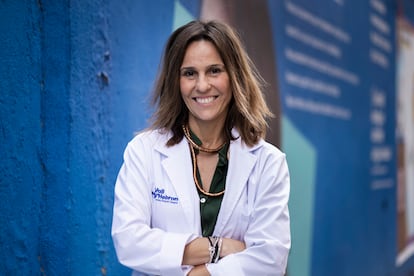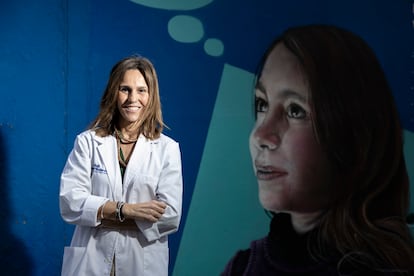Cardiologist Begoña Benito: ‘Now research is being done with a gender perspective’
The scientist, who became the first female director of the Vall d’Hebron Research Institute in its 30-year history, says that advanced immunology treatments and gene therapy will be ‘fundamental’ to treating diseases

The eyes of researcher Margarita Salas, the chemist Rosalind Franklin, and the pharmacologist Gertrude Belle Elion, who promoted immunotherapy, gaze at visitors from the walls that surround the Vall d’Hebron Research Institute (VHIR) in Barcelona. Painted in an imposing mural a stone’s throw from the hospital, their likenesses are a reminder of these science pioneers, trailing the blaze for hundreds of women scientists who step onto the scientific campus every day.
“I find them all admirable, but my favorite is probably Margarita Salas. Her scientific career was marked by talent and personal effort more than by recognition (which came later), and she was a generous scientist, who established a school and offered opportunities to young people scientists,” says cardiologist Begoña Benito. She is another pioneer: the first female director that VHIR has had in its 30-year history.
With a professional life “straddling hospitals and research institutes,” combining her role as a cardiologist with her laboratory study of hereditary disorders that cause arrhythmias and sudden death, the director of the VHIR knows well the ins and outs of scientific activity and its benefits and drawbacks.
“We have the talent and we must conserve it, but the world of research is very hard. If we focus on clinicians, that is, doctors or health professionals who want to do research, it is not usually included in their day-to-day work: they have to do it after hours and on a voluntary basis. And then the environment is also difficult among the researchers in the laboratory: there are very few opportunities to get stable positions, salaries are low, and positions are very competitive and difficult to get,” the scientist reflects after a year in office.
Benito, who will inaugurate the new research building at the culmination of the VHIR’s thirtieth anniversary celebrations this year, emphasizes the need to improve funding in science. “The institutes here function by making a living through external funding. But we have the talent and the science we do is good, despite funding limitations,” she explains.
Question. You are the first woman to head the institution. Has your outlook changed?
Answer. I have brought a change of perspective, but due to my professional situation as a hospital doctor, it is one that places me close to the hospital. It is also one that understands the need to promote research at the institute and that brings the two institutions together. Because I am a woman, it is possible that I have implemented changes in the organization’s culture, but I suppose this happens to any person who leads, who implements their way of doing things on the entire community of workers.
Q. Is research carried out with a gender perspective?
A. Yes. It has been progressively introduced and is being implemented more and more. Now research is being done with a gender perspective. There has been a very important change in recent years.
Q. You are a cardiologist in the cardiovascular field, where we can still see a gender bias. If a woman suffers a heart attack, she is at greater risk of dying. Heart attacks are detected later, the symptoms are undervalued, there are fewer invasive procedures performed on women, to name a few.
A. We are in a process of change. Having introduced the gender perspective does not mean we have achieved equity. For example, we are aware that at a cardiovascular level, women can present a heart attack differently, and heart attacks have not been classically recognized in women because they were described in books according to how men experience them. This was previously unknown, but we know it now. In recent years, the situation of women in cardiovascular disease has become clearly visible and this makes everyone aware.
The emergence of big data and AI will allow us to offer health solutions in record time”
Q. What is left to do?
A. We are on the right path with research, which means including women or the female sex in all scientific research. It is important to seek parity or at least a certain proportionality with the prevalence of the disease in any type of research. Afterwards, carrying out population studies identifying the differential elements between men and women may be of interest. We will not always have to be studied together because the biology may be different. And I mentioned the female sex earlier because, if we are thinking about doing experimental research, only male animals were used in the past, and that is not the case today.
Q. How have technological advances in big data and artificial intelligence (AI) changed the way we do research?
A. In the health field, everything that is big data and AI has entered with brutal potential and is advancing at a very rapid pace. So much so that we are following on behind, trying to get on the bandwagon somehow. But there is a problem that must be overcome, which is data protection, or access to data. That has been the immediate limitation, perhaps. But solutions are being presented at the European level.
Q. Do these technologies speed up research?
A. In research, it will help us perform analysis and establish relationships and predictions much faster. In medicine, it will help us refine the diagnosis and prognosis of diseases, in addition to providing very valuable support as a management tool for more administrative tasks, such as reporting.

Q. What implications will they have on health?
A. We are in the development and discovery phase of its full potential. Its applications are breaking out little by little, and they will certainly change our way of doing science and medicine in the future. The emergence of big data and AI analyses will accelerate getting results and that will be positive because it will allow us to offer health solutions in record time. But on the more medical, more clinical side, I like to think that we will keep the human touch.
Q. A strategic line of your project for the VHIR is immunology. What do you expect from advanced therapies?
A. Understanding how immunology works and being able to modify it is essential to treat a large number of diseases. It is essential to study this aspect, either because we want to promote an immune response to fight cancer or because we want to reduce it because we do not want to have transplant rejection. In addition, it is increasingly understood that there is an inflammatory component in many diseases. So, being able to regulate this immune response can help treat many diseases across the board.
Q. Will the impact of immunotherapy in cancer be transferred to other pathologies?
A. I hope so. We have already participated in a trial that uses CAR-T [a cellular therapy that consists of extracting T lymphocytes from the patient, modifying them in the laboratory with genetic engineering, and returning them to the patient so that they can better fight the tumor] in lupus. We are already broadening our sights, and immunology is not restricted to cancer. Advanced therapies also include gene therapy, which is another great priority for us because we are a campus that brings together patients with rare diseases. And for many of these diseases the solutions are gene therapy because many of them are genetic. Gene therapy has a way to go, and it is going to be important.
Sign up for our weekly newsletter to get more English-language news coverage from EL PAÍS USA Edition
Tu suscripción se está usando en otro dispositivo
¿Quieres añadir otro usuario a tu suscripción?
Si continúas leyendo en este dispositivo, no se podrá leer en el otro.
FlechaTu suscripción se está usando en otro dispositivo y solo puedes acceder a EL PAÍS desde un dispositivo a la vez.
Si quieres compartir tu cuenta, cambia tu suscripción a la modalidad Premium, así podrás añadir otro usuario. Cada uno accederá con su propia cuenta de email, lo que os permitirá personalizar vuestra experiencia en EL PAÍS.
¿Tienes una suscripción de empresa? Accede aquí para contratar más cuentas.
En el caso de no saber quién está usando tu cuenta, te recomendamos cambiar tu contraseña aquí.
Si decides continuar compartiendo tu cuenta, este mensaje se mostrará en tu dispositivo y en el de la otra persona que está usando tu cuenta de forma indefinida, afectando a tu experiencia de lectura. Puedes consultar aquí los términos y condiciones de la suscripción digital.









































